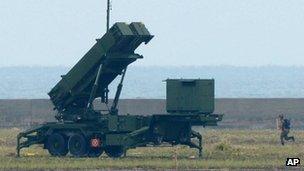North Korea defies warnings in rocket launch success
- Published
The news of the rocket launch was announced on state TV, with people in Pyongyang saying it gave them "great pride"
North Korea has successfully launched a long-range rocket, defying international warnings.
The Unha-3 rocket, launched at 09:49 local time (00:49 GMT), appears to have followed its planned trajectory, with stages falling in expected areas.
North Korea says a satellite has been placed in orbit; the US confirmed an object had been put into space.
South Korea, the US and Japan have condemned the launch as a disguised test of long-range missile technology.
A UN resolution passed in June 2009 after North Korea's second nuclear test banned Pyongyang from ballistic missile tests.
The US called it a "highly provocative act that threatens regional security", while UN Secretary General Ban Ki-moon said it was a "clear violation" of the UN resolution.
Japan has called for an emergency meeting of the UN Security Council. Reports suggested this could take place later on Wednesday.
The launch comes a week ahead of the South Korean presidential election and roughly a year after the death of leader Kim Jong-il, on 17 December 2011.
'Extremely regrettable'
The three-stage rocket was launched from a site on North Korea's west coast.
"The launch of the second version of our Kwangmyongsong-3 [Unha-3] satellite from the Sohae Space Centre... on December 12 was successful," state news agency KCNA said. "The satellite has entered the orbit as planned."
The rocket had been scheduled to pass between the Korean peninsula and China, with a second stage coming down off the Philippines.
"The missile was tracked on a southerly azimuth [angle]. Initial indications are that the first stage fell into the Yellow Sea," a North American Aerospace Defence Command (Norad) statement said, external.
"The second stage was assessed to fall into the Philippine Sea. Initial indications are that the missile deployed an object that appeared to achieve orbit."
The Japanese government, which put its armed forces on alert ahead of the launch, said the rocket had passed over parts of Okinawa prefecture, south of the Japanese mainland.
"The missile that North Korea calls a satellite passed over Okinawa around 10:01. We launched no interception," a government statement quoted by AFP news agency said.
Japan had threatened to shoot down any debris which infringed on its territory, deploying naval vessels and land-based missile interceptors.
Its top government spokesman called the launch "extremely regrettable" and something that Japan "cannot tolerate".
South Korean President Lee Myung-bak, meanwhile, called an emergency meeting of his top advisers. His foreign minister said the government strongly condemned the launch.
The US called the launch another "example of North Korea's pattern of irresponsible behaviour".

Japan said the rocket passed over its territory, but it did not shoot it down
In China - which is North Korea's closest ally - Foreign Ministry spokesman Hong Lei expressed "regret" at the launch. A commentary from state-run Xinhua news agency called on all parties to remain "cool headed" and engage in "trust-building measures".
April failure
North Korea had said two days ago that the launch could be delayed because of a technical problem, extending the window until 29 December.
South Korea, the US and other nations had urged North Korea not to go ahead, warning that it would constitute a test of long-range missile technology banned by the UN.
Washington and its allies say the rocket launches represent banned missile tests because the basic technology is the same.
North Korea is believed to be working on the development of a long-range missile capable of reaching the west coast of the US mainland.
It has not previously successfully launched a three-stage rocket. Its most recent test, in April 2012, ended in failure, when the rocket flew for only a few minutes before exploding and crashing into the sea west of the Korean peninsula.
The closed communist nation has also carried out two nuclear tests, in 2006 and 2009. International talks on ending its nuclear ambitions have been stalled for several years.
Officials fear it could be working towards a missile on which a nuclear warhead could be mounted - but it is not thought to have fully developed either the missile or the warheads yet.
